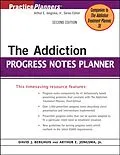The Addiction Progress Notes Planner contains complete
prewritten session and patient presentation descriptions for each
behavioral problem in The Addiction Treatment Planner, Third
Edition. The prewritten progress notes can be easily and
quickly adapted to fit a particular client need or treatment
situation.
* Saves you hours of time-consuming paperwork, yet offers the
freedom to develop customized progress notes
* Organized around 41 main presenting problems that range from
opioid dependence to new chapters in this edition covering such
co-occurring disorders as chronic pain, dangerousness/lethality,
and self-care deficits
* Features over 1,000 prewritten progress notes (summarizing
patient presentation, themes of session, and treatment
delivered)
* Provides an array of treatment approaches that correspond with
the behavioral problems and DSM-IV-TR diagnostic categories in
The Addiction Treatment Planner, Third Edition
* Offers sample progress notes that conform to the requirements
of most third-party payors and accrediting agencies, including the
JCAHO and the NCQA
Autorentext
ARTHUR E. JONGSMA, Jr., PhD, is the Executive Director of Life Guidance Services, a full service counseling center of over thirty therapists in Grand Rapids, Michigan, who provide evidenced-based treatment for children, adolescents, and adults. He is the originator and Series Editor of the PracticePlanners books and software.
DAVID J. BERGHUIS, MA, LLP, is in private practice and has worked in community mental health for more than eleven years. He is the coauthor of several books including The Severe and Persistent Mental Illness Treatment Planner.
Klappentext
PracticePlanners®
The Bestselling treatment planning system for mental health professionals
The Addiction Progress Notes Planner contains complete prewritten session and patient presentation descriptions for each behavioral problem in The Addiction Treatment Planner, Third Edition. The prewritten progress notes can be easily and quickly adapted to fit a particular client need or treatment situation.
- Saves you hours of time-consuming paperwork, yet offers the freedom to develop customized progress notes
- Organized around 41 main presenting problems that range from opioid dependence to new chapters in this edition covering such co-occurring disorders as chronic pain, dangerousness/lethality, and self-care deficits
- Features over 1,000 prewritten progress notes (summarizing patient presentation, themes of session, and treatment delivered)
- Provides an array of treatment approaches that correspond with the behavioral problems and DSM-IV-TR diagnostic categories in The Addiction Treatment Planner,Third Edition
- Offers sample progress notes that conform to the requirements of most third-party payors and accrediting agencies, including the JCAHO and the NCQA
Zusammenfassung
The Addiction Progress Notes Planner contains complete prewritten session and patient presentation descriptions for each behavioral problem in The Addiction Treatment Planner, Third Edition. The prewritten progress notes can be easily and quickly adapted to fit a particular client need or treatment situation.
- Saves you hours of time-consuming paperwork, yet offers the freedom to develop customized progress notes
- Organized around 41 main presenting problems that range from opioid dependence to new chapters in this edition covering such co-occurring disorders as chronic pain, dangerousness/lethality, and self-care deficits
- Features over 1,000 prewritten progress notes (summarizing patient presentation, themes of session, and treatment delivered)
- Provides an array of treatment approaches that correspond with the behavioral problems and DSM-IV-TR diagnostic categories in The Addiction Treatment Planner, Third Edition
- Offers sample progress notes that conform to the requirements of most third-party payors and accrediting agencies, including the JCAHO and the NCQA
Inhalt
PracticePlanners® Series Preface.
Acknowledgments.
Introduction.
Adult-Child-of-an-Alcoholic (ACOA) Traits.
Anger.
Antisocial Behavior.
Anxiety.
Attention-Deficit / Hyperactivity Disorder (ADHD).
Attention-Deficit / Inattentive Disorder (ADD).
Borderline Traits.
Childhood Trauma.
Chronic Pain.
Dangerousness / Lethality.
Dependent Traits.
Depression.
Eating Disorders.
Family Conflicts.
Gambling.
Grief / Loss Unresolved.
Impulsivity.
Legal Problems.
Living Environment Deficiency.
Mania / Hypomania.
Medical Issues.
Narcissistic Traits.
Nicotine Abuse / Dependence.
Occupational Problems.
Opioid Dependence.
Oppositional Defiant Behavior.
Parent / Child Relational Problem.
Partner Relational Conflicts.
Peer Group Negativity.
Posttraumatic Stress Disorder (PTSD).
Psychosis.
Relapse Proneness.
Self-Care Deficits: Primary.
Self-Care Deficits: Secondary.
Sexual Promiscuity.
Social Anxiety / Skills Deficit.
Spiritual Confusion.
Substance Abuse / Dependence.
Substance Induced Disorders.
Substance Intoxication / Withdrawal.
Suicidal Ideation.
Treatment Resistance.
